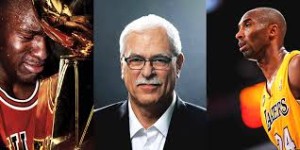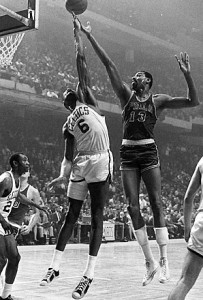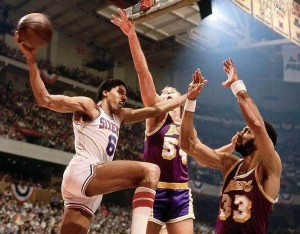 You could be forgiven for thinking there’s merit in Phil Jackson, the most successful coach in NBA history, comparing Michael Jordan and Kobe Bryant as Basketball players.
You could be forgiven for thinking there’s merit in Phil Jackson, the most successful coach in NBA history, comparing Michael Jordan and Kobe Bryant as Basketball players.
But such comparisons are good for nothing more than stirring up argument among friends, preferably at a neighborhood sports bar. For, as Kobe shrewdly tweeted on May 17, 2013 in response to Jackson’s comments:
The comparisons are #apple2oranges.
For example, Muhammad Ali is the self-professed “greatest fighter of all time.” But many Boxing analysts would argue (in fact, have argued) that no fighter in the history of the sport would’ve stood a chance against Mike Tyson in his prime.
And here is why argument always ensues:
I disagree; because I remember well how Ali literally toyed with George Foreman, the Tyson of his day, before knocking him out in the eighth round of their historic “Rumble in the Jungle.” But I digress.
 For what it’s worth, Jackson claims that Michael was tougher than Kobe, physically and mentally; that he was better at controlling a game, offensively and defensively; and that, unlike Kobe, who tends to panic and force things when his shot is off, Michael had the self-confidence to dominate the game in other ways until his shot came back to him, which it invariably did.
For what it’s worth, Jackson claims that Michael was tougher than Kobe, physically and mentally; that he was better at controlling a game, offensively and defensively; and that, unlike Kobe, who tends to panic and force things when his shot is off, Michael had the self-confidence to dominate the game in other ways until his shot came back to him, which it invariably did.
Fine. I just wish he wasn’t telling us things we have seen for ourselves a thousand times.
Which begs the question: why would Jackson betray his reputation for inscrutable, Zen-like wisdom by peddling such pedestrian observations? Oh, right, he’s stirring up sales for his new memoir, Eleven Rings: The Soul of Success.
Given that title, I suppose he could’ve added that Michael was better still because he helped Jackson win six of those eleven rings as coach of the Chicago Bulls (1989-98); whereas Kobe helped him win only five as coach of the Los Angeles Lakers (1998-2011).
Incidentally, I have no doubt that Kobe will return next season from what should have been a career-ending torn Achilles last month. But I fear he will fail in his quest to tie or surpass Michael’s tally of six rings.
Indeed, the only way Kobe could emulate Michael at this point would be to end his career in even greater ignominy than Michael did. And that, alas, was as a wobbly, hobbling shadow of himself, playing more as team mascot than team leader for the Washington Wizards.
 But, given that Jackson is clearly using championship rings as a measure of success, Bill Russell must figure prominently in any argument about the best player in NBA history. After all, he won 11 rings in 13 seasons as the star of the Boston Celtics and, by serving as coach as well for two of those championship seasons, he established a level of accomplishment no player can ever emulate.
But, given that Jackson is clearly using championship rings as a measure of success, Bill Russell must figure prominently in any argument about the best player in NBA history. After all, he won 11 rings in 13 seasons as the star of the Boston Celtics and, by serving as coach as well for two of those championship seasons, he established a level of accomplishment no player can ever emulate.
Yet nothing betrays these silly apple2oranges comparisons quite like Wilt Chamberlain, arguably the most dominant player in NBA history, managing to win only two rings. This should remind folks like Jackson and barroom debaters that the success of superstars like Michael and Kobe always depends on teammates like Scottie Pippen and Shaquille O’Neal, respectively.
 Not to mention that Dr. J (Julius Erving) was easily the most exciting player to watch, bar none – a fact borne out by The Doctor, a documentary showcasing his high-flying, gravity-defying feats that premiers on NBA TV next week.
Not to mention that Dr. J (Julius Erving) was easily the most exciting player to watch, bar none – a fact borne out by The Doctor, a documentary showcasing his high-flying, gravity-defying feats that premiers on NBA TV next week.
Meanwhile, LeBron James, the league’s current MVP, is leading his team, the Miami Heat, in a do-or-die series against the Indiana Pacers for the sacrificial honor of facing the indomitable San Antonio Spurs in this year’s NBA Finals.
But even if he were to lead them pass Indiana and San Antonio, LeBron would be rewarded with only his second ring. Which means that he would have to win at least three more (perhaps even in three-peat fashion) to be a serious contender in these apples2oranges comparisons.
Related commentaries:
Best fighter of all time…